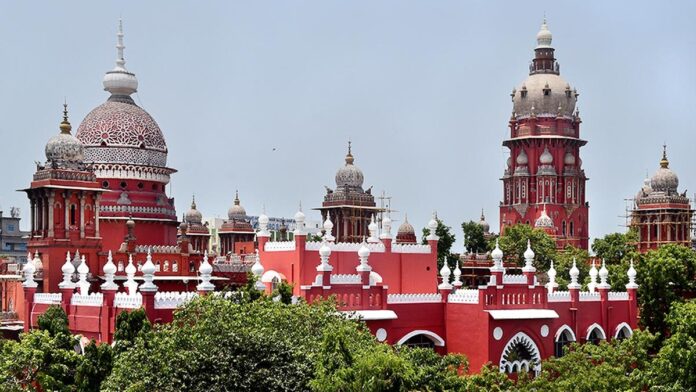The Madras High Court has restrained an American citizen from proceeding with a divorce case filed by her before the King County Superior Court in Washington, United States, and also from initiating any kind of legal proceedings related to her marriage before the courts in Singapore.
Justice V. Lakshminarayanan granted the anti-suit injunction after agreeing with her husband, an Indian citizen, that the Family Court in Chennai would be the right forum to decide on the matrimonial dispute between the couple, who got married in 2013 under the Special Marriage Act of 1954.
After their wedding, the couple had relocated to the United States and had a child in 2016. In 2023, they relocated to Singapore and in 2024, the woman lodged a complaint accusing her husband of assault. Shortly thereafter, he flew down to India and sought divorce on the grounds of cruelty and adultery.
The woman was made one of the respondents to the divorce petition filed before the Family Court in Chennai on September 4, 2024. On September 6, 2024, she too filed a divorce petition before the Washington court though she was residing with her child in Singapore then.
An e-mail written by her to the American Citizen Services at the U.S. embassy in Singapore, seeking a passport for her child, referred to the divorce petition filed by her estranged husband in Chennai and stated that “she needs to submit herself before the courts in India” in order to prevent an ex parte order, the judge pointed out.
On the contrary, she flew to San Francisco with the child on October 14, 2024, just a day before the husband could obtain an injunction order from a court in Singapore restraining her from moving the child outside Singapore. After flying to the U.S., she began pursuing her divorce plea filed in Washington.
Anti-suit injunction application
The husband then moved an anti-suit injunction application before the Family Court in Chennai. When no orders were passed on that application, he filed a civil revision petition before the High Court seeking a direction to the Family Court to dispose of his divorce plea within six months.
The judge said that a direction simpliciter to dispose of the divorce plea at the earliest, without granting any interim relief, might lead to a situation of fait accompli if the petitioner’s estranged wife continues to prosecute the matrimonial disputes before the courts in Washington or Singapore.
Asserting that the power of the High Court, to have superintendence over all trial courts, under Article 227 of the Constitution was very wide, the judge suo motu ordered the transfer of the anti-suit injunction application from the Family Court to the High Court, and allowed it.
Justice Lakshminarayanan agreed with the petitioner’s counsel Geetha Luthra, assisted by Deepika Murali and K. Harishankar, that even if the King County Superior Court at Washington grants divorce at the woman’s instance, it would not be recognised by the courts in India.
Grounds for divorce under SMA
The judge pointed out that the divorce plea before the Washington court had been filed on the ground that the marriage had broken down irretrievably though no such ground finds a place under the provisions of the Special Marriage Act of 1954 for grant of divorce.
“Any decree obtained by invoking that ground will not be recognised in India, which would result in the wasteful expenditure for the parties to continue the litigation in Washington. If divorce is granted in U.S. and the first respondent (petitioner’s wife) were to remarry and subsequently, the courts in India were to refuse to recognise the decree, the consequences will be disastrous,” the judge wrote.
He also said, though Singapore would have been the best place to file the divorce proceedings from the point of view of convenience of both parties, such a plea could not be filed over there due to the legal requirement that the couple must have resided in that country for at least three years.
‘Complete trial by Sept. 2025’
Since the marriage had been solemnised at Villivakkam in Chennai and all evidence as well as witnesses required for the conduct of the trial in the divorce plea were here, the judge directed the Family Court in Chennai to proceed with the trial and complete it before September 30, 2025.
Taking note that the petitioner was a man of means, the judge directed him to pay 30,000 Singapore dollars a month towards maintenance from September 2024 till the disposal of the divorce case. He was also ordered to pay a lump sum of ₹10 lakh towards her litigation expenses.
After making it clear that the Family Court should not insist on physical presence of the woman and permit her to appear through video conference for counselling as well as trial, the judge said, the petitioner must provide her, and the child, business class flight tickets and five-star accommodation if they have to appear in person.
Published – December 21, 2024 05:07 pm IST
